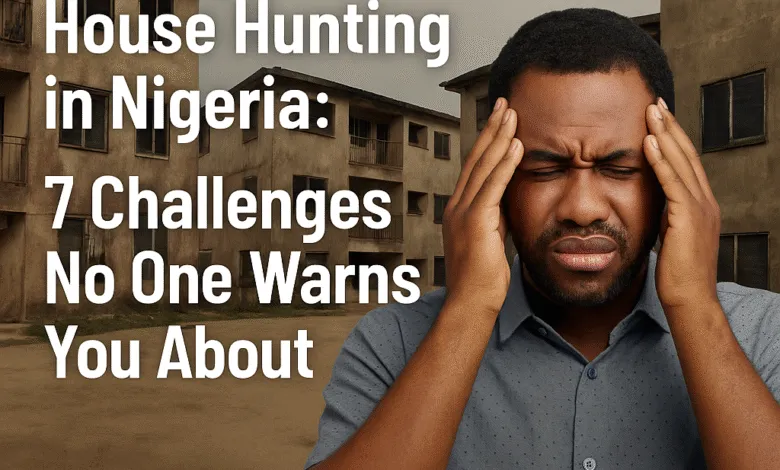The Ugly Side of House Hunting in Nigeria: 7 Nightmare Struggles Exposed

House hunting in Nigeria is no easy feat. Whether you’re moving into your first home or searching for an upgrade, the process can be stressful, overwhelming, and, at times, downright frustrating. In this article, we’ll explore the seven most common challenges house hunters face in Nigeria and provide practical tips to help you navigate them. So, if you’re searching for a home, keep reading to discover what you need to know.
1. High Costs and Expensive Rent
Many people face steep rental costs when house hunting in Nigeria. Rental prices in major cities like Lagos, Abuja, and Port Harcourt can be astronomical.
According to the Nigerian National Bureau of Statistics (NBS), rental prices have increased by 9.4% in the last year, further pushing housing out of reach for many Nigerians. With rising inflation and the demand for housing, landlords often increase their prices. In some cases, landlords may require renters to pay a full year’s rent upfront.
Tip: To manage these costs, consider exploring less congested neighbourhoods or negotiating rent terms with landlords to help reduce costs. Additionally, it’s always worth researching the average rental rates for different areas before committing.
Remember that while prime locations come at a high price, emerging areas might offer better value and future appreciation. If rent feels out of reach, consider exploring affordable ways to invest in real estate.
2. Limited Housing Options in Prime Locations
Finding the right property in a prime location can be a huge hurdle when house hunting in Nigeria. Popular areas with easy access to workplaces, schools, and other amenities frequently attract crowds, resulting in limited housing stock.
A report from The Nigerian Real Estate Group (NREG) revealed that demand for housing in urban centres has outstripped supply by over 30%. As a result, competition is fierce, and the chances of landing a perfect spot seem slim.
Tip: In this case, try looking at emerging areas that are seeing growth in infrastructure. These areas often offer better prices and long-term value potential. If location is non-negotiable, you may need to be flexible with the type of property you’re willing to accept. Consider options like apartments, shared homes, or even exploring the outskirts of urban centres.
3. Unreliable Landlords and Agents
One of the most frustrating challenges house hunters face is dealing with unreliable landlords and real estate agents. From unreturned phone calls to unclear terms, the lack of professionalism can be exasperating.
According to the Building Collapse Prevention Guild (BCPG), poor construction quality is one of the primary reasons behind the increasing number of building collapses in Nigeria.
Tip: To avoid this, always deal with reputable agents and do thorough checks on landlords before signing any agreements. Asking for references or feedback from previous tenants can also help you avoid unpleasant surprises. It’s also wise to ensure that the agent or landlord is appropriately licensed and registered with relevant bodies in Nigeria.
4. Poor Housing Quality
In Nigeria, not all houses on the market are of excellent quality, and this makes house hunting a daunting task. The Building Collapse Construction Guild (BCPG) blames poor construction quality for Nigeria’s rising number of building collapses. It’s not uncommon to find homes that appear perfect in photos but reveal structural or maintenance issues when viewed in person. This could include faulty plumbing, broken appliances, or even substandard building materials.
Tip: When inspecting a property, take your time. Check for cracks and leaks and assess the overall condition before deciding. If you’re concerned about structural issues, bring a trusted contractor. Additionally, it’s crucial to evaluate the house’s safety features, like fire exits, security bars, and proper fencing.
5. Bureaucratic Hurdles
According to the Nigerian Property Investment Summit, legal issues account for more than 35% of property disputes in Nigeria. Navigating the legal and administrative processes in Nigeria can be tricky for those house hunting.
Whether you’re dealing with property documentation, registration, or permits, the bureaucratic red tape can slow things down and cause delays. This is especially true when dealing with unregistered or improperly documented properties.
Tip: To avoid delays, always ensure that all paperwork is in order and verify the legitimacy of the property documents with legal experts before proceeding. Be prepared for potential setbacks in the approval process. Ensuring that the title deed is authentic and checking for any outstanding debts on the property can help you avoid future disputes.
6. Inconsistent Power and Water Supply
The World Bank revealed that Nigeria’s electricity supply fell short, leaving 60% of the country without reliable power. Many houses, especially in urban areas, struggle with unreliable electricity and water supplies, adding to the stress of house hunting in Nigeria.
This inconsistency can turn a seemingly perfect house into a major headache. When choosing a property, it’s crucial to consider the availability of these essential utilities.
Tip: Ask about the property’s power and water situation upfront. When budgeting, consider the cost of backup generators or water tanks. Many Nigerians invest in alternative power sources, such as solar panels, to combat frequent power outages. If you’re moving to a more rural area, confirm that the area has a consistent water supply.
7. Security Concerns
Security is a growing concern for many Nigerians engaging in house hunting. Nigeria’s urban crime rates soared 12% in Five Years, Raising Red Flags for Homebuyers.
Some areas are known for higher crime rates, making it challenging to feel safe in specific neighbourhoods. This is a valid concern for anyone planning to settle in a new home.
Tip: Before committing to a property, consider the neighbourhood’s security features. Look for gated communities, check local crime rates, and, if possible, talk to current residents about their experiences.
Many Nigerians opt for homes with enhanced security features like CCTV cameras, private guards, and automated gates. It’s also a good idea to research the neighbourhood’s crime history and seek out areas with a visible police presence.
Conclusion
House hunting in Nigeria presents numerous challenges, but these hurdles can be overcome with the right mindset and preparation. From managing costs to ensuring proper documentation, being informed and patient can make all the difference.
If you’re ready to begin your house-hunting journey, start by researching the areas you’re interested in and prepare for the ups and downs that come with finding your dream home.
Share your house-hunting experiences in the comments below and let us know how you navigated these common challenges!




